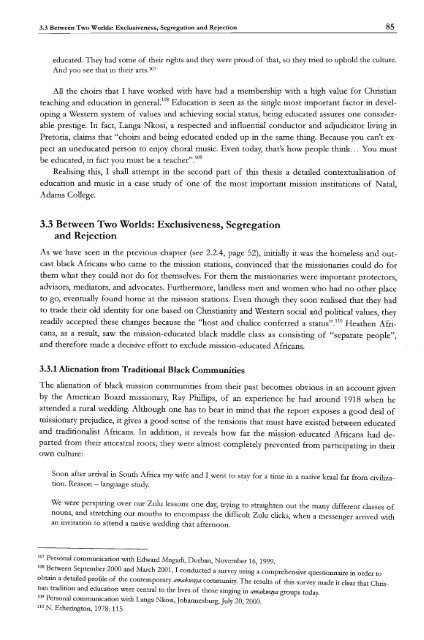South African Choral Music (Amakwaya): Song, Contest and the ...
South African Choral Music (Amakwaya): Song, Contest and the ...
South African Choral Music (Amakwaya): Song, Contest and the ...
You also want an ePaper? Increase the reach of your titles
YUMPU automatically turns print PDFs into web optimized ePapers that Google loves.
3.3 Between Two Worlds: Exclusiveness, Segregation <strong>and</strong> Rejection 85<br />
educated. They had some of <strong>the</strong>ir rights <strong>and</strong> <strong>the</strong>y were proud of that, so <strong>the</strong>y tried to uphold <strong>the</strong> culture.<br />
And you see that in <strong>the</strong>ir arts. 107<br />
All <strong>the</strong> choirs that I have worked with have had a membership with a high value for Christian<br />
teaching <strong>and</strong> education in general. 108 Education is seen as <strong>the</strong> single most important factor in developing<br />
a Western system of values <strong>and</strong> achieving social status, being educated assures one considerable<br />
prestige. In fact, Langa Nkosi, a respected <strong>and</strong> influential conductor <strong>and</strong> adjudicator living in<br />
Pretoria, claims that "choirs <strong>and</strong> being educated ended up in <strong>the</strong> same thing. Because you can't expect<br />
an uneducated person to enjoy choral music. Even today, that's how people think... You must<br />
be educated, in fact you must be a teacher".109<br />
Realising this, I shall attempt in <strong>the</strong> second part of this <strong>the</strong>sis a detailed contextualisation of<br />
education <strong>and</strong> music in a case study of one of <strong>the</strong> most important mission institutions of Natal,<br />
Adams College.<br />
3.3 Between Two Worlds: Exclusiveness, Segregation<br />
<strong>and</strong> Rejection<br />
As we have seen in <strong>the</strong> previous chapter (see 2.2.4, page 52), initially it was <strong>the</strong> homeless <strong>and</strong> outcast<br />
black <strong>African</strong>s who came to <strong>the</strong> mission stations, convinced that <strong>the</strong> missionaries could do for<br />
<strong>the</strong>m what <strong>the</strong>y could not do for <strong>the</strong>mselves. For <strong>the</strong>m <strong>the</strong> missionaries were important protectors,<br />
advisors, mediators, <strong>and</strong> advocates. Fur<strong>the</strong>rmore, l<strong>and</strong>less men <strong>and</strong> women who had no o<strong>the</strong>r place<br />
to go, eventually found home at <strong>the</strong> mission stations. Even though <strong>the</strong>y soon realised that <strong>the</strong>y had<br />
to trade <strong>the</strong>ir old identity for one based on Christianity <strong>and</strong> Western social <strong>and</strong> political values, <strong>the</strong>y<br />
readily accepted <strong>the</strong>se changes because <strong>the</strong> ''host <strong>and</strong> chalice conferred a status".ttO Hea<strong>the</strong>n <strong>African</strong>s,<br />
as a result, saw <strong>the</strong> mission-educated black middle class as consisting of "separate people",<br />
<strong>and</strong> <strong>the</strong>refore made a decisive effort to exclude mission-educated <strong>African</strong>s.<br />
3.3.1 Alienation from Traditional Black Communities<br />
The alienation of black mission communities from <strong>the</strong>ir past becomes obvious in an account given<br />
by <strong>the</strong> American Board missionary, Ray Phillips, of an experience he had around 1918 when he<br />
attended a rural wedding. Although one has to bear in mind that <strong>the</strong> report exposes a good deal of<br />
missionary prejudice, it gives a good sense of <strong>the</strong> tensions that must have existed between educated<br />
<strong>and</strong> traditionalist <strong>African</strong>s. In addition, it reveals how far <strong>the</strong> mission-educated <strong>African</strong>s had departed<br />
from <strong>the</strong>ir ancestral roots; <strong>the</strong>y were almost completely prevented from participating in <strong>the</strong>ir<br />
own culture:<br />
Soon after arrival in <strong>South</strong> Africa my wife <strong>and</strong> I went to stay for a time in a native kraal far from civilization.<br />
Reason - language study.<br />
We were perspiring over our Zulu lessons one day, trying to straighten out <strong>the</strong> many different classes of<br />
nouns, <strong>and</strong> stretching our mouths to encompass <strong>the</strong> difficult Zulu clicks, when a messenger arrived with<br />
an invitation to attend a native wedding that afternoon.<br />
107 Personal communication with Edward Mngadi, Durban, November 16, 1999.<br />
108 Between September 2000 <strong>and</strong> March 2001, I conducted a survey using a comprehensive questionnaire in order to<br />
obtain a detailed profile of <strong>the</strong> contemporary amakw

















